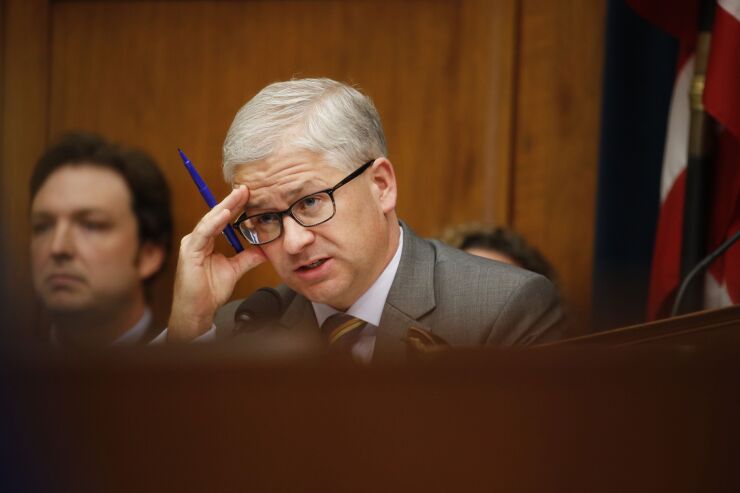WASHINGTON — The coronavirus pandemic has hardened congressional views on bank regulation in both parties, with Republicans urging agencies to finish rules intended to foster economic growth and Democrats calling for a pause on loosening restrictions that protect consumers.
The competing approaches have intensified as Trump-appointed regulators aim to finish regulations dealing with issues from payday lending to mortgage underwriting to the definition of brokered deposits.
The stakes are also higher with the 2020
“This happens in the run-up to any election because rulemakings take time to complete, and administrations have to plan ahead if they want to accomplish something given there’s a risk of not being re-elected,” said Jeffrey Naimon, a partner at Buckley who defends financial services companies in enforcement matters. “There is typically tension between one party saying ‘hurry along, hurry along’ and the other party saying ‘slow down’ in the face of an election."

Rep. Patrick McHenry, R-N.C., the top Republican on the House Financial Services Committee, has argued that rules under consideration will promote economic activity to counter the sharp downturn sparked by the pandemic.
"In consideration of the limitations that businesses face today, and the magnitude of the costs imposed by the pandemic, I urge you and your staff to work expeditiously to create the most favorable conditions for growth and employment," he wrote in letters earlier this month to leaders at the Federal Reserve, Federal Deposit Insurance Corp., Office of the Comptroller of the Currency, Consumer Financial Protection Bureau and Federal Housing Finance Agency.
McHenry cited the
"It’s important that you fulfill those responsibilities that you have to see those things through and to take necessary measures related to the current crisis,” McHenry said at a May virtual roundtable with regulators.
On the other side of the political spectrum, Sen. Sherrod Brown of Ohio, the top Democrat on the Senate Banking Committee,
The Biden administration once again extended the pause on student loan payments enacted to help borrowers during the COVID-19 pandemic, this time through the end of August.
The two states' combined plans amount to over $1.5 billion of the Homeowner Assistance Fund included within the American Rescue Plan Act , which was passed a year ago.
An uptick in pandemic-related payment suspensions reflecting new or restarted plan activity previously occurred as the omicron variant spread, but activity has since subsided.
"The rules you issue, which let banks off the hook today, mean more bailouts, tomorrow," Brown said at a hearing earlier this month. "Now that we face an economic crisis, at a level that we've not seen, since the Great Depression, it should be an opportunity for you to rethink old habits. But, as far as I can tell, you're not."
Analysts say the pandemic crisis, rather than motivating lawmakers to think differently about financial policy, has instead further grounded them in their views on regulation.
“It comes as a shock to no one that members of Congress will use the pandemic to reinforce their longstanding positions,” said Ed Mills, a policy analyst at Raymond James. “Republicans want deregulatory actions from the federal banking regulators. Democrats don’t. … In many ways, COVID-19 has just caused members of Congress to further cement their opinions on whether regulation is good or regulation is bad.”
Brown's letters argued that the coronavirus pandemic handicaps the public's ability to participate in rulemaking processes.
"Under these circumstances, it will be difficult for the public to have the customary engagement with government agencies and provide meaningful recommendations and comments on proposed rulemakings other than those related to the crisis at hand," he said.
But Karen Petrou, managing partner at Federal Financial Analytics, said Democrats' position is consistent with their views before the crisis, since they are essentially calling for a suspension of rulemakings that they have fought all along.
“The Democrats believe that there are other more critical priorities than finishing rules, especially those they oppose,” Petrou said.
If anything, the crisis has amplified the polarization over financial policy on Capitol Hill.
“If McHenry really thought something was really good for the economic growth of the country, economic growth is even more important now," said Aaron Klein, policy director at the Brookings Institution’s Center on Regulation and Markets. "If Brown thought something was really important to protect the financially vulnerable, well, they are more financially vulnerable now.”
Yet Klein added that supporters of the pending rules likely want them finalized quickly to protect against a Democratic-controlled Congress and new president overturning them through the Congressional Review Act. The 1996 law gives Congress 60 legislative session days from a rule’s issuance to consider its repeal.
“Some of the push to get this done sooner is to avoid the Congressional Review Act, which, if Congress substantially changes or the Senate flips, becomes quite possible in another administration even if the same regulators are still on the job,” Klein said.
Still, some observers say that the coronavirus pandemic does provide grounds for finalizing regulations that were in the works before the pandemic.
“If you look at the list of rules that McHenry lists, which is very comprehensive, almost all of them have implications for either communities affected by COVID or instruments that will probably be affected in one form or another," said Diego Zuluaga, associate director of financial regulation studies at the Cato Institute. “Things like the CFPB payday rules, which we are expecting will come out in new form any day now, that is quite relevant for COVID-19 … because a lot of households don’t have access to alternative short-term credit."
Zuluaga added that one could make a similar argument for finalizing a pending FDIC and OCC doctrine as it relates to banks’ ability to bypass state interest rate caps.
“ ‘Valid when made’ has been an issue for at least five years … but the impact on the secondary market for loans, whether business loans or personal loans, is such that you could also say it’s going to ease the flow of credit and make it easier to gain access to liquidity for those who have been affected by the pandemic,” Zuluaga said. “Because this crisis has so many ramifications for financial regulation, almost every regulatory measure can be construed as relevant for COVID-19.”
Consumer advocates argue that the direction that the Trump administration’s regulators have taken with pending rules favors the industry at the expense of the consumer, especially in the middle of a pandemic.
“I am extremely disappointed that ... [McHenry] says, 'Finish these rulemakings,'" said Ed Mierzwinski, senior director of the federal consumer program at the U.S. Public Interest Research Group. "Most of these rulemakings benefit industry and consumer groups don’t have an army of associates the way the downtown law firms that work for the banks and even the debt collectors have.”








